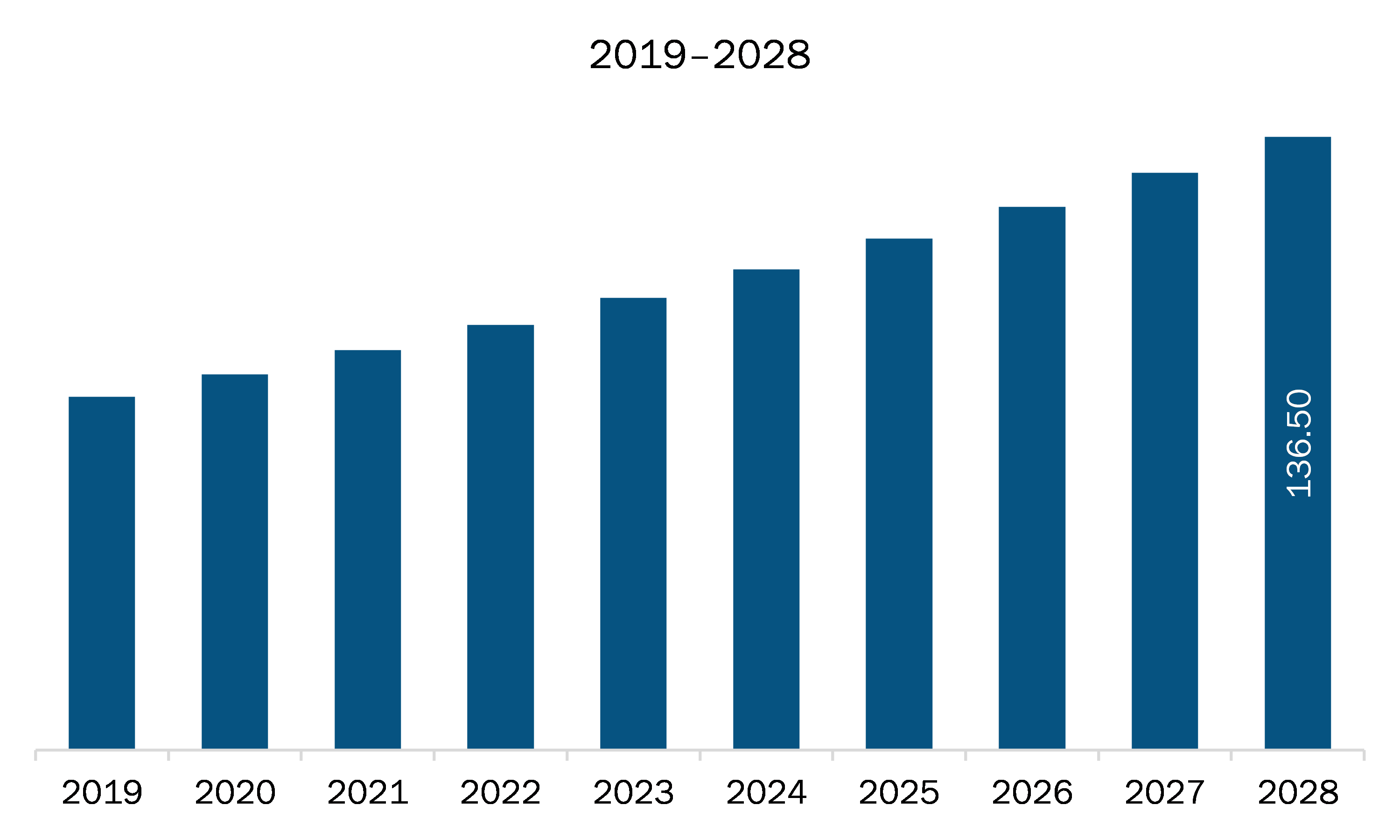The MEA immunohistochemistry market is expected to grow from US$ 88.98 million in 2021 to US$ 136.50 million by 2028; it is estimated to grow at a CAGR of 6.3% from 2021 to 2028.
The UAE, South Africa, and Saudi Arabia are major economies in MEA. Rising acceptance of automation in immunohistochemistry is expected to fuel the market growth. Traditional diagnostic tests were generally conducted in laboratories with expensive equipment and staffed with trained personnel accountable for performing the tests. Since the last few decades, diagnostic testing has gradually progressed out of the central laboratory and into testing sites, which is close to patients. The rising demand for immunohistochemistry, coupled with a shortage of working staffs in the immunology labs, has created a need for automation in immunohistochemistry. Automation in immunohistochemistry (IHC) provides the opportunity to improve sensitivity levels, reproducibility, standardization, as well as offers advantages such as a reduction in working time and saving of reagents. Analytical flexibility is one of the essential factors required in the immunohistochemistry protocols. Automation of the IHC contributes to standardize the immunohistochemical techniques decisively. Moreover, it also helps to simplify 16-step manual methods to 5-step methods that help to minimize the number of working personnel. Furthermore, the automated immunohistochemistry ensures consistent quality and discharge of stains and improves the standardization and optimization of the different techniques. Moreover, with reliable and fast results, automation can provide diagnostic test results at better speed, leading to shortening the period of hospitalization, resulting in cost-savings. Thus, various benefits offered by automation in immunohistochemistry (IHC) are likely to be accepted and act as one of the prevalent trends in the MEA market over the coming years.
In case of COVID-19, MEA is highly affected especially South Africa. Economic uncertainties and ongoing conflicts are worsening the condition in the region. For instance, countries such as Syria, Libya, and Yemen are suffering violent conflicts and cannot implement robust public health measures. Iran was in deep economic recession due to the US sanctions. Also, the major source of economic stabilization in Middle East countries is oil production and export. However, the recent pandemic is causing turbulence to the economies of the Middle East. A sudden drop in domestic and external demand for goods and products, especially crude oil, and halted production due to labor shortage, are major impacts observed in the region. The spread of coronavirus in the region caused heavy burdens on healthcare professionals. Cardiac surgeons were overloaded with emergency cardiac surgeries, management of coronavirus patients, and implementation of safety guidelines to prevent the spread of virus. Rapid spread to virus impacted to elective surgeries. These factors are projected to hamper the growth of MEA immunohistochemistry market.
With the new features and technologies, vendors can attract new customers and expand their footprints in emerging markets. This factor is likely to drive the MEA immunohistochemistry market. The MEA immunohistochemistry market is expected to grow at a good CAGR during the forecast period.

- This FREE sample will include data analysis, ranging from market trends to estimates and forecasts.
MEA Immunohistochemistry Market Segmentation
MEA Immunohistochemistry Market – By Product
- Equipment
- Slide Staining Systems
- Tissue Microarray Systems
- Tissue Processing Systems
- Slide Scanners
- Other Equipment
- Antibodies
- Primary Antibodies
- Secondary Antibodies
- Reagents
- Histological Stains
- Blocking and Fixation Reagents
- Chromogenic Substrates
- Fixation Reagents
- Stabilizers
- Organic Solvents
- Proteolytic Enzymes
- Diluents
- Kits
MEA Immunohistochemistry Market – By Application
- Diagnostics
- Cancer
- Infectious Diseases
- Autoimmune Diseases
- Diabetes Mellitus
- Nephrological Diseases
- Others
- Drug Testing
MEA Immunohistochemistry Market – By End User
- Hospitals and Diagnostic Laboratories
- Research Institutes
- Others
MEA Immunohistochemistry Market, by Country
- UAE
- Saudi Arabia
- South Africa
- Rest of MEA
MEA Immunohistochemistry Market - Companies Mentioned
- Abcam plc
- Agilent Technologies, Inc.
- Bio SB
- BIO-RAD LABORATORIES INC.
- Danaher
- F. HOFFMANN-LA ROCHE LTD.
- MERCK KGaA
- PerkinElmer Inc.
- THERMO FISHER SCIENTIFIC INC.
Middle East and Africa Immunohistochemistry Report Scope
| Report Attribute | Details |
|---|---|
| Market size in 2021 | US$ 88.98 Million |
| Market Size by 2028 | US$ 136.50 Million |
| CAGR (2021 - 2028) | 6.3% |
| Historical Data | 2019-2020 |
| Forecast period | 2022-2028 |
| Segments Covered |
By Application
|
| Regions and Countries Covered |
Middle East and Africa
|
| Market leaders and key company profiles |
|
- Historical Analysis (2 Years), Base Year, Forecast (7 Years) with CAGR
- PEST and SWOT Analysis
- Market Size Value / Volume - Regional, Country
- Industry and Competitive Landscape
- Excel Dataset
Recent Reports
Testimonials
Reason to Buy
- Informed Decision-Making
- Understanding Market Dynamics
- Competitive Analysis
- Identifying Emerging Markets
- Customer Insights
- Market Forecasts
- Risk Mitigation
- Boosting Operational Efficiency
- Strategic Planning
- Investment Justification
- Tracking Industry Innovations
- Aligning with Regulatory Trends






















 Get Free Sample For
Get Free Sample For